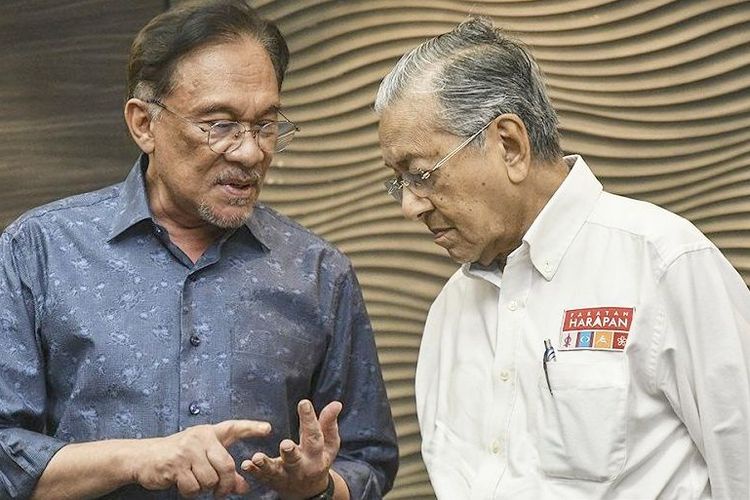Why Anwar must punish Mahathir
21 Feb 2024 • 4:00 PM MYT

TheRealNehruism
Writer. Seeker. Teacher

Image credit: Kompas
When you are at the top, like it or not, you are either an example or you must be made an example of.
Leaders are selected because they are presumed to have qualities and characteristics that the group, be it a nation or a tribe, idealizes and wishes to emulate.
Part of the reason why a leader is given power, is because as possessors of qualities and characteristics that are idealized by the group, they are authorized by the group to use the power bestowed upon them to instill and cultivate the qualities they possess in the group.
The problem however, is that Lord Acton famously said, power has a tendency to corrupt, and absolute power tends to corrupt absolutely.
Once a leader is hoisted into a position of power, sooner or later, the power in their position will almost certainly corrupt the fiber of their being, but being in the position of leadership and possessing power, they will still carry the image of someone that is worth idealizing or emulating.
Herein lies the danger. A corrupted leader who is emulated and idealized by the group, will inculcate cancerous traits and characteristics into the group, which will then rot the group from within. If the rot itself doesn’t kill the group from within, then its weakened state will make it vulnerable to external predators, who are ever looking for weak groups, be it nations or tribes, to prey upon.
Anwar in a speech yesterday, has ominously warned whoever in the country that that deems themselves to be so untouchable and powerful, that they can embezzle huge sums without fear of punishment on account of the influence they wield, that the day of reckoning is before them.
“My room at Sungai Buloh remains vacant,” Anwar said. “Let me make it clear. Whether you hold titles like Datuk Seri, Tan Sri, or Tun, if you are virtuous, we respect you. However, if you engage in corruption, we will apprehend you and imprison you, “he was quoted as saying.
I will go on a limb to say that Anwar’s warning is directed to people like Daim and Mahathir, because he would further add that age is not an obstacle to one being held accountable for one’s wrongdoing.
“So, if an old person robs, is it acceptable?
“If an old person rapes, is it acceptable? Where did you learn this?” he lambasted.
“In old cases, if someone took RM200, I forgive them, but in old cases where RM20 billion was taken, that’s not my money, it’s your money, it’s the people’s money,” he was also quoted as saying.
Considering his reference to old age and theft to the amount of billions, the people that first came to my mind in reference to what he said, rightly or wrongly, are old timers like Daim and Mahathir, who to be frank, are generally considered by the grassroots in the country, as chief amongst those who have taken billions from the country.
The fact that Anwar was blasting those who asked him to turn a blind eye on old people who had robbed the country on account of their old age, is to me, also another sign that the person that Anwar wants to put in his old room in Sungai Buloh is old timers like Mahathir and Daim.
People at the grassroot who do not wish to see the likes of Mahathir or Daim being punished, mostly cite the age of Mahathir and Daim as the reason why they do not wish to see them punished. Other than their age, many are also of the opinion that these old timers, despite their shortcomings, have done a lot for the country, and thus deserve a get out of jail card, even if they are guilty of doing things like embezzling the wealth of the country, because of their age and contribution.
While quite a few of us seem to have taken have a cultural, compassionate and emphatical line of reasoning as to why they don’t want to see someone as old and familiar as Daim and Mahathir to be punished, I have to remind you that that in terms of organizational psychology, the likes of Daim and Mahathir have to be seen to receive at least some form of punishment nevertheless, to send a clear signal to the organization, that the qualities that Mahathir and Daim represent, are no longer seen as qualities and characteristics that is worthy of emulation and admiration by the organization.
It is only if we send this signal clearly, will such cancerous practices, like corruption, cronyism or nepotism, which is, rightly or wrongly, associated with the likes of Mahathir and Daim, become a quality that will be rejected by the masses.
As long as Mahathir and Daim are honored and esteemed, no matter how many times you tell the people to not practise such things like corruption, or that corruption is an illegal and sinful activity, they will still practise it, because it is the nature of people to follow examples, not instruction.
To change the quality and characteristic of the people – or more precisely, to reform the quality and characteristics of the people – if Anwar wishes to establish himself as a leader who will reform the old ways, then he is duty bound to make an example out of the likes of Mahathir and Daim. He has no choice.
Other than to stem the old practices and bring about a change, Anwar also has to take action against Mahathir and Daim, to claim his right as a leader who has the authority to set the examples and ideals for the nation.
A succeeding leader either inherits the right to lead from his predecessor or wrests the right by overthrowing his predecessor.
If a succeeding leader inherits the right to lead, the succeeding leader must, by and large, use the preceding leader as an example for the nation. They can add characteristics of their own or subtract some aspect of the earlier leadership that no longer fit the times, but by and large, they must still use the preceding leader as an example for the nation.
If the succeeding leader gains the right to lead by overthrowing his predecessor however, the succeeding leader must make an example of the preceding leader, to justify the reason why he or she overthrew the preceding leadership.
Although Anwar was once the political heir of Mahathir, he cannot be said to be succeeding Mahathir, on account of the bad blood between the two, which has lasted for the last 25 years.
In any case, the very fact that Anwar is almost certainly not going to use Mahathir as a leader to admire and emulate, is a clear indication that Anwar does not see himself as inheriting the mantle of leadership from Mahathir or Mahathir’s successors.
Being so, Anwar, must thus be defined as a succeeding leader who overthrew the leadership of Mahathir and his successors, and thus he must now justify the reason he overthrew Mahathir, by taking adequate actions against Mahathir and his men.
He must, because if doesn’t, he will lose the right to set an example for the nation, which is equivalent to losing the right to lead.
A person cannot simply overthrow the reign of a country to satisfy their personal desires or ambitions. If you overthrow the leadership of a country, it must be because you are concerned that the ideals and examples set by the previous leader are going to bring ruin to the nation and the people.
If you believe that the previous leaders' ideals and examples are bringing ruin to the country and the nation, after you successfully overthrow the previous leadership, you have to take action against them.
The logic has to flow in this manner, or the entire sequence of events will become false.
If Anwar doesn't take any action against the old order , it will look like he only overthrew the previous regime to satisfy his own desire, which will then cause him to lose his right to set an example for the people and the nation.
Like it or not, Anwar must act against Mahathir and members of the old regime, because he is compelled to do so, by powers beyond his ken. We can hope that he will be benign and magnanimous in punishing the members of the old order - in that he has a choice - but he must punish them, at least symbolically, or less lose his right to lead the nation.
Nehru Sathiamoorthy is the author of “While Waiting for the World to end”. He was a columnist at FMT and a frequent contributor to the South China Morning Post, The Star, Malaysia-Today, MalaysiaNow, MalaysiaKini and Focus Malaysia.
No comments:
Post a Comment